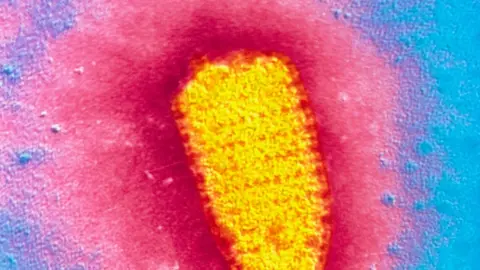Norwegian woman dies from rabies after Philippines puppy bite
 Birgitte Kallestad
Birgitte KallestadA Norwegian woman has died after contracting rabies from a stray puppy in the Philippines.
Birgitte Kallestad, 24, was on holiday with friends when they found the puppy on a street, her family said in a statement.
The puppy is thought to have infected her when it bit her after they took it back to their resort.
She fell ill soon after returning to Norway, and died on Monday at the hospital where she worked.
It is the first rabies-related death in Norway for more than 200 years.
Her family said Ms Kallestad had sterilised the "small scrapes" given by the puppy as she played with it, but sought no more medical attention.
"Our dear Birgitte loved animals," said her family. "Our fear is that this will happen to others who have a warm heart like her".
Rabies can cause a life-threatening infection of the brain and nervous system in humans.
The disease is nearly always fatal without vaccinations and kills thousands of people every year, mostly in Asia and Africa.
Pre-exposure vaccines are available to help with prevention. Post-exposure vaccinations are also recommended for anyone who may have come into contact with a rabid animal.
Rabies vaccines are not compulsory under Norwegian law, but Norway's Institute of Public Health recommends them for certain types of visits to affected countries, including the Philippines.
"We are very sympathetic with the family," said Siri Feruglio, a Senior Medical Officer at the Institute, in an interview with the BBC.
"It's really important to stress that even if you've been vaccinated before you travel, if you do have contact [with a potentially infected animal] you need to go to a local health clinic for a second vaccination.
"This is a disease that's endemic in 150 countries and it's a huge health problem."

What is rabies?
 Science Photo Library
Science Photo Library- Initial symptoms can include anxiety, headaches and fever
- As the disease progresses, there may be hallucinations and respiratory failure
- Spasms of the muscles used for swallowing make it difficult for the patient to drink
- The incubation period between being infected and showing symptoms is between three and 12 weeks
- If you are bitten, scratched or licked by an animal you must wash the wound or site of exposure with plenty of soap and water and seek medical advice without delay
- Once symptoms have developed, rabies is almost always fatal
- Before symptoms develop, rabies can be treated with a course of vaccine - this is "extremely effective" when given promptly after a bite - along with rabies immunoglobulin if required
- Every year, more than 15m people worldwide receive a post-bite vaccination and this is estimated to prevent hundreds of thousands of deaths but effective treatment is not readily available to those in need
- Pre-exposure immunisation is recommended for people in certain high-risk occupations and for travellers to rabies-affected, remote areas
Source: Public Health England/World Health Organization
